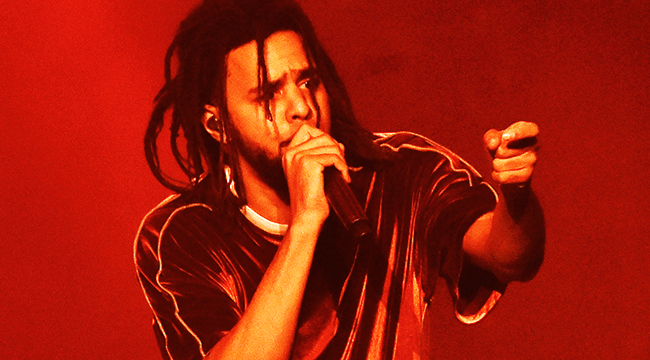
When the list of 2019 Grammy nominees was announced, one name was conspicuously absent from the Best Rap Album category — depending on your views. Despite J. Cole’s 2018 effort, KOD, selling platinum (with no features), it was not selected as one of the top five albums from a rapper by the group of music industry professionals that make up the Grammy nomination committee.
The albums that were selected: Cardi B’s Invasion Of Privacy, Mac Miller’s Swimming, Nipsey Hussle’s Victory Lap, Pusha T’s Daytona, and Travis Scott’s Astroworld. Seeing that lineup, J. Cole’s fans were sent into a frenzy of complaints about the supposed snub. Aside from the expected complaints about the perceived content discrepancy between KOD and the nominated albums — particularly Cardi’s and Travis’ — fans wondered why even the singles from the album didn’t get nominated.
So i'm guessing J. Cole's "KOD" was a mixtape or didnt speak about "pussy", money, personal belongings and violence enough to be qualified for the "Best hip hop album" huh?? The #GRAMMYs just continues to disappoint in that category.
— ISLAND WOLF (@PALMTREEMONK) December 7, 2018
But what if KOD wasn’t snubbed? While those fans who believe it was may have a few legitimate complaints, KOD was a very conventional project — albeit a very well-executed one — in a year where dozens of conventional projects came and went, while the nominees were just a portion of the genre-pushing albums that moved hip-hop forward in 2018. Though a five-album field makes the job of narrowing down the representative sample incredibly difficult, one thing is for sure: KOD doesn’t belong on that list.
J. Cole’s fans definitely disagree. Within hours of the nomination announcements, they’d bombarded social media with several reasons the album deserved the nomination. One of the primary praises for KOD was its messaging, which tackled a perceived drug abuse issue within hip-hop among fans. While that perception may be somewhat overblown, J. Cole managed to address a subject his fans see as a pressing need, partially due to the deaths of Lil Peep and Mac Miller. The beats, which featured Cole’s broadest musical experimentation in years, finally branched out from his own sample-driven production work and included collaborators like T-Minus. His rhymes were as poignant as ever, at times showing empathy on top of Cole’s standard gift for wordplay-propelled storytelling.
To think Cardi B’s album was nominated for the Grammys and J. Cole wasn’t is beyond me. KOD has to be the most important Album of 2018, with the rate at which Drugs are being abused
— Kendrick 🥷🏽 (@Kendrick_Amazin) December 7, 2018
However, while it’s a smart and thoughtful album, KOD‘s greatest drawback is that it sounds so much like an album that Cole has already made. Right now, you’re probably wondering, “Dope beats, dope rhymes, what more do you want?” But if all of hip-hop in 2018 were condensed to that simple mantra, you’d be hard-pressed to hold KOD up against many other albums and swear in court that it’s head-and-shoulders above even the albums that stuck to its purist-pleasing lane.
From Saba’s Care For Me to Noname’s Room 25, heady, socially-conscious rap met a ridiculously high standard last year. In terms of the working class narratives Cole spins throughout KOD, Jay Rock’s Redemption matches it for visceral imagery, with the added bonus of a thick layer of authenticity that Cole’s more intellectual approach can’t touch. Meanwhile, in Compton, Buddy recontextualized many of the pointed components of g-funk to craft the boundary-stretching Harlan & Alondra. If all these — and more — fail to meet the standard for nomination, KOD surely had a steep hill to climb.
https://twitter.com/Colton_Cb3/status/1071100028926812160
Even if we ignore the more ignorant fan complaints and any possible shortcomings for KOD or praise for other albums that didn’t meet the criteria, the fact remains that the five albums nominated are actually pretty darn great themselves. Contrary to some J. Cole supporters’ assertions, the albums that were nominated don’t actually differ all that much from his, except in perspective. While Cole plays the sage observer, the probing novelist in his records, Cardi B and Nipsey’s recollections ring closer to the straight-from-the-horse’s-mouth truth. Though Travis is a gleeful hedonist, J. Cole is no choir boy, and even as Cole paints all the details of the toxic outcomes of drug addictions in vivid, acrylic color, Pusha T shoots photographs like Rocket in City In God.
Each of the albums nominated for the Best Rap Album Grammy could make an argument with innovative production, the addition of lively new voices to the hip-hop discussion, history-making, and the injection of a thread of out-the-mud reality to rap music it ordinarily wouldn’t have. With so many albums in contention for the category last year, it stands to reason that the nomination committee was looking for something ear-catching, something that stood out. The truth is that as much as Cole’s fans cast him as a rebellious outsider, his output on this record didn’t do those things, and ended up sounding too much like everything else.






